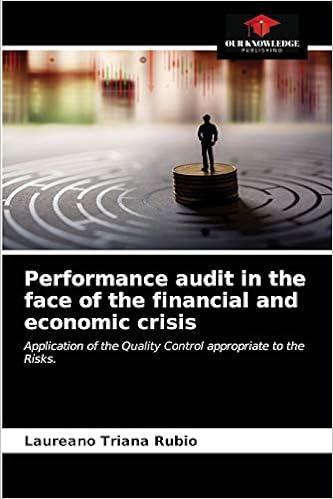Question
1. The following data are for the Bi Star Technologies for the year ended December 31, 2011: Beginning inventory $325,000 Net purchases $945,000 Net sales
1. The following data are for the Bi Star Technologies for the year ended December 31, 2011:
| Beginning inventory | $325,000 | Net purchases | $945,000 |
| Net sales revenue | $2,100,000 | Normal gross profit percentage | 40% |
What is the estimated ending inventory?
A.
$10,000
B.
$635,000
C.
$167,500
D.
$762,000
2.
Given the following data, what is the value of the ending inventory as determined by the LIFO method?
| Sales revenue | 300 units at $15 per unit |
| Purchases | 240 units at $10 per unit |
| Beginning inventory | 120 units at $9 per unit |
A.
$2,940
B.
$540
C.
$600
D.
$2,880
3.
Given the following data, what is the value of the ending inventory as determined by the FIFO method?
| Sales revenue | 300 units at $15 per unit |
| Purchases | 240 units at $10 per unit |
| Beginning inventory | 120 units at $9 per unit |
A.
$540
B.
$600
C.
$2,820
D.
$2,880
4.
Given the following data, calculate the cost of ending inventory using the FIFO costing method.
| Date | Item | Unit |
| 1/1 | Beginning inventory | 30 units at $10 per unit |
| 2/25 | Purchase of inventory | 15 units at $12 per unit |
| 5/20 | Purchase of inventory | 25 units at $13 per unit |
| 8/15 | Purchase of inventory | 20 units at $14 per unit |
| 10/17 | Purchase of inventory | 25 units at $15 per unit |
| 12/31 | Ending inventory | 65 units |
A.
$740
B.
$720
C.
$915
D.
$545
5.
Given the following data, calculate the value of ending inventory using the
averageminuscost
method.
| Date | Item | Unit |
| 1/1 | Beginning inventory | 40 units at $12 per unit |
| 3/5 | Purchase of inventory | 18 units at $14 per unit |
| 5/30 | Purchase of inventory | 24 units at $18 per unit |
| 12/31 | Ending inventory | 20 units |
A.
$1,419.12
B.
$ 851.71
C.
$1,164.00
D.
$ 284.00
6.
Under a perpetual inventory system, when a sale is made:
A.
the company makes a journal entry to record the sale and the cost of goods sold.
B.
the company makes a journal entry to record only the cost of goods sold.
C.
no journal entry needs to be made.
D.
the company makes a journal entry to record the sale only.
7.
Tonga Industries reported the following:
| Net Sales | $450,000 | Cost of goods sold | $360,000 |
| Operating expenses | $60,000 | Tax Rate | 40% |
The net income is:
A.
$ 18,000.
B.
$ 12,000.
C.
$180,000.
D.
$ 30,000.
8.
Given the following data, calculate the cost of ending inventory using the LIFO costing method.
| Date | Item | Unit |
| 1/1 | Beginning inventory | 30 units at $10 per unit |
| 2/25 | Purchase of inventory | 15 units at $12 per unit |
| 5/20 | Purchase of inventory | 25 units at $13 per unit |
| 8/15 | Purchase of inventory | 20 units at $14 per unit |
| 10/17 | Purchase of inventory | 25 units at $15 per unit |
| 12/31 | Ending inventory | 65 units |
A.
$740
B.
$915
C.
$720
D.
$545
Step by Step Solution
There are 3 Steps involved in it
Step: 1

Get Instant Access to Expert-Tailored Solutions
See step-by-step solutions with expert insights and AI powered tools for academic success
Step: 2

Step: 3

Ace Your Homework with AI
Get the answers you need in no time with our AI-driven, step-by-step assistance
Get Started


